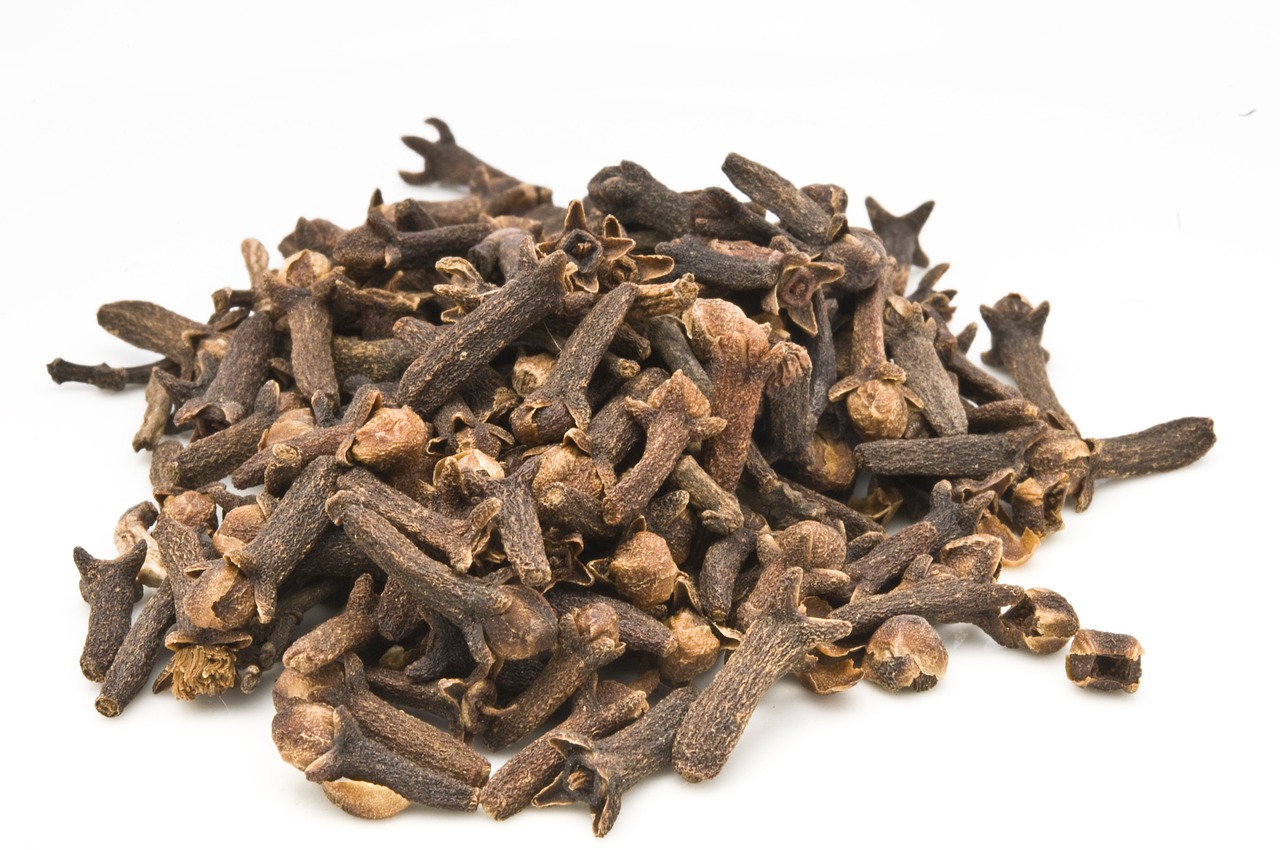
Cloves, which come from the dried flower buds of the clove tree, have a long and interesting history connected to trade, medicine, and cultural practices. They were introduced to India early on and became essential in Ayurvedic medicine for treating digestive and respiratory issues. Here are few benefits of Clove listed below:-
Pain relief: Cloves contain eugenol, a compound known for its pain-relieving and anti-inflammatory properties, making them effective for various types of pain, particularly toothaches. Clove oil numbs the gums and provides immediate dental pain relief while also possessing antibacterial properties that combat infection and inflammation related to dental issues. For relief, a drop of clove oil can be applied to a cotton ball placed on the affected area, or one can chew a whole clove. Additionally, clove oil can alleviate headaches by reducing blood vessel tension and improving circulation. Mixing clove oil with a carrier oil and massaging it on the forehead and temples can enhance this soothing effect. Eugenol in cloves possesses anti-inflammatory properties, making clove oil effective for relieving muscle pain, joint pain, and soreness. It can reduce inflammation related to conditions such as arthritis and sprains. To use it, dilute clove oil with a carrier oil and massage it into the affected area, or mix it with olive oil, warm it slightly, and apply around the ear for mild pain relief. Cloves can also soothe a sore throat due to their numbing and anti-inflammatory effects; gargling with clove oil diluted in warm water can help alleviate throat pain.
Digestive health: Clove stimulates the production of digestive enzymes that are crucial for breaking down food and absorbing nutrients, helping to prevent bloating and indigestion. It also acts as a carminative, easing gas formation in the digestive tract by relaxing smooth muscles, which alleviates bloating and cramps. Additionally, clove enhances saliva production, aiding in the initial digestion process and facilitating food passage. It can soothe indigestion symptoms like heartburn and acid reflux by neutralizing stomach acids and reducing gastrointestinal inflammation, benefiting those with acidity or GERD. Clove is a natural remedy for nausea, particularly from digestive issues, due to its antiemetic properties. It can be consumed through chewing or as tea to soothe the stomach. Cloves also promote gut health by maintaining a balanced gut microbiome and stimulating bile production in the liver, which aids in fat digestion and nutrient absorption. This makes cloves beneficial for those with digestive challenges. For digestive support, one can drink clove tea after meals, chew cloves to prevent bloating, or incorporate clove powder into food and drinks. Cloves are safe when used moderately, but caution is advised with clove oil or supplements due to potential side effects like irritation and interactions with medications. Those with liver issues should be particularly careful, as eugenol can affect liver enzymes. It is recommended to consult a healthcare professional before using clove for medicinal purposes, especially in concentrated forms.
Aromatherapy: Aromatherapy utilizes essential oils for therapeutic benefits, with clove oil being popular for its warming, stimulating, and soothing effects. It is known for enhancing mental stimulation and focus, helping to clear mental fog and improve concentration. Clove oil’s strong aroma energizes the mind, making it beneficial during stress or fatigue. It can be used in a diffuser to promote mental clarity and alleviate tiredness. Additionally, it has calming properties that reduce stress and anxiety, especially when combined with oils like lavender or chamomile. Clove oil can also be blended with a carrier oil for massage to relieve tension and stress. Clove oil is beneficial for respiratory health, making it useful in aromatherapy for colds, coughs, and sinus congestion. Its expectorant qualities aid in clearing the respiratory system and enhancing breathing. To use, add clove oil to steam inhalation or a diffuser to alleviate congestion and improve airflow. Additionally, its antibacterial properties help purify the air and decrease infection spread.
Cosmetics: Clove oil is effective in treating acne due to its antibacterial and anti-inflammatory properties, which help eliminate bacteria and reduce inflammation. It can be diluted with a carrier oil for direct application on acne-prone skin and is often found in skincare products like spot treatments and cleansers. Rich in antioxidants, clove oil promotes collagen production, contributing to reduced fine lines and improved skin elasticity. Regular use in anti-aging products can result in a more youthful appearance. Its anti-inflammatory properties also soothe irritated skin and assist in healing cuts and insect bites. Additionally, it can help calm redness and swelling when applied to affected areas. Clove oil is beneficial for hair health, promoting scalp health, preventing dandruff, and stimulating hair growth due to its antimicrobial properties. It can be used by adding a few drops to shampoo or conditioner or mixed with a carrier oil for scalp treatments. Its rich aroma enhances hair fragrance and is popular in perfumes and colognes, often blended with other essential oils like cinnamon and vanilla to create complex scents.
Cloves have a rich history and are valued for their medicinal benefits and culinary uses. Originating from the Spice Islands, they have significantly influenced global culture, trade, and health. Used as a spice, a natural remedy, and a symbol of luxury, cloves continue to be an important and cherished resource.
-Triparna







